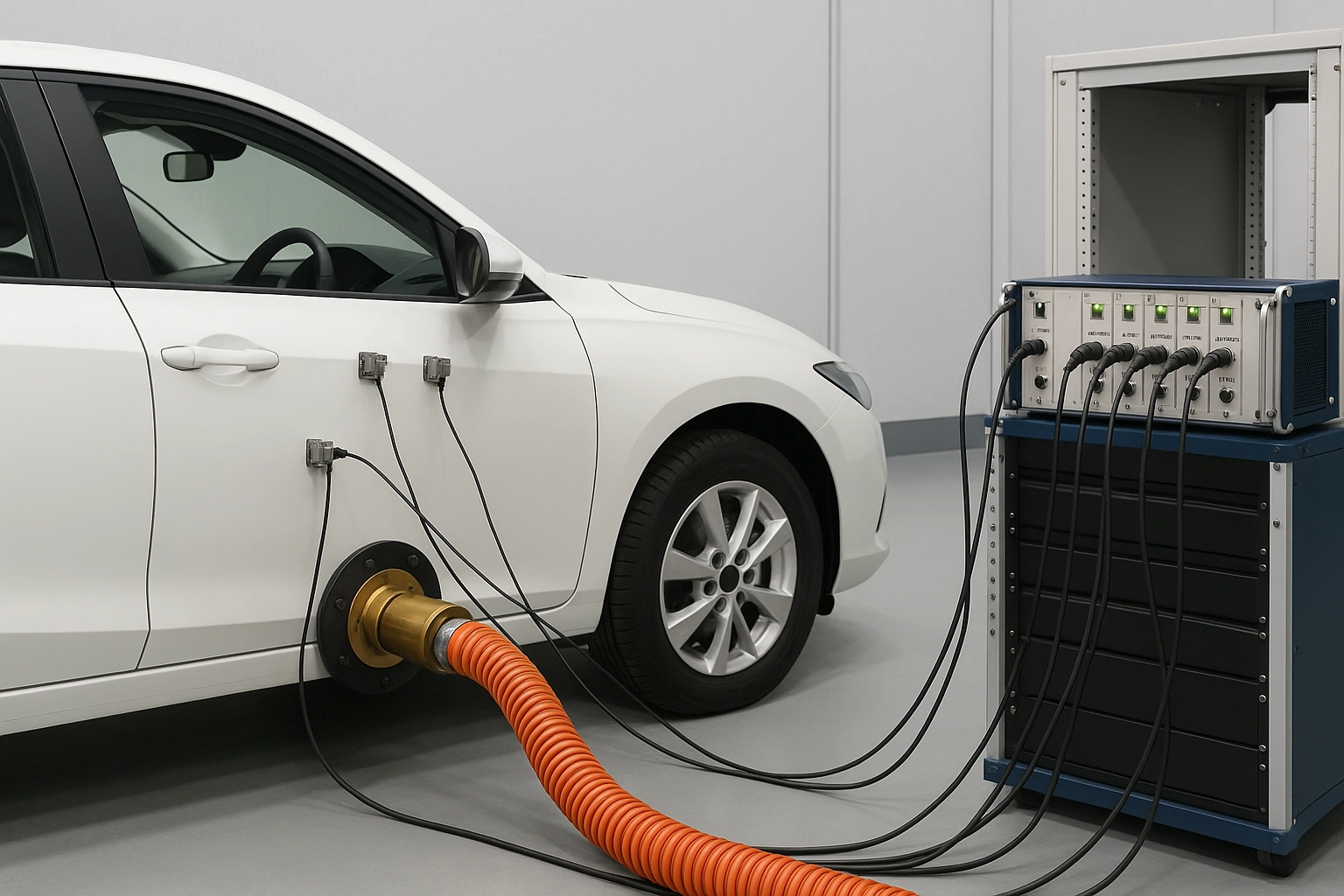JIS D1001 Vehicle Interior Material Acoustic NVH Test
The JIS D1001 acoustic noise, vibration, and harshness (NVH) test is a critical procedure designed to evaluate the sound quality of vehicle interior materials. This test focuses on assessing the absorption characteristics of these materials over specific frequency ranges to ensure they meet the stringent requirements set forth by Japan Industrial Standards.
This testing method is particularly vital for automotive manufacturers aiming to enhance passenger comfort and reduce noise pollution within vehicles. By quantifying how well a material absorbs sound, this process helps identify which textiles or composite materials are most effective at dampening unwanted sounds such as road noise or engine hums. For quality managers and compliance officers responsible for meeting these standards, understanding the intricacies of JIS D1001 provides essential insights into selecting appropriate interior components.
The test involves placing a sample of material between two chambers where controlled sound waves are generated and measured at various frequencies. The absorption coefficient is calculated based on the reduction in sound intensity that passes through the specimen. This data not only informs engineers about potential improvements but also serves as evidence for regulatory bodies during audits or certification processes.
Real-world applications of this test include testing seat fabrics, door panels, headliners, and other components that contribute significantly to cabin acoustics. Engineers often use JIS D1001 results early in the product development cycle to identify areas needing improvement before full-scale prototypes are created. Additionally, it allows companies to compare different materials efficiently during their sourcing decisions.
The process begins with detailed preparation of each sample according to specified dimensions and thicknesses outlined by the standard. Once prepared, they undergo rigorous testing using specialized equipment capable of generating precise sound waves across multiple octaves. Afterward, technicians analyze results meticulously before providing comprehensive reports detailing performance metrics against JIS D1001 criteria.
Understanding the nuances behind JIS D1001 helps stakeholders appreciate its importance in ensuring superior vehicle interior design and functionality while complying with international standards.
Scope and Methodology
| Test Parameters | Measuring Equipment | Procedure Steps |
|---|---|---|
| Absorption coefficient at various frequencies. | Sound intensity meter, sound source generator. | Sample preparation, chamber setup, sound wave generation, measurement and calculation of absorption coefficient. |
| Specimen dimensions and thicknesses. | Calipers, micrometers. | Detailed alignment within chambers to ensure accurate measurements. |
| Environmental conditions during testing. | Humidity sensors, temperature controllers. | Maintaining consistent environmental factors to minimize variability. |
| Data analysis and reporting. | Computers with specialized software. | Analyzing collected data against JIS D1001 criteria for final results. |
The test adheres closely to the guidelines provided in JIS D1001, ensuring accurate and reproducible results. Compliance with these standards is crucial for manufacturers seeking to produce vehicles that not only meet legal requirements but also offer superior acoustic performance.
For those involved in automotive design or production, mastering the techniques described here can lead to significant improvements in vehicle interiors. From enhancing passenger comfort through better sound management to reducing manufacturing costs by optimizing material selection, JIS D1001 plays a pivotal role in modern automotive engineering.
Eurolab Advantages
At Eurolab, our expertise and commitment to excellence make us the preferred choice for automotive manufacturers looking to comply with JIS D1001 standards. Our state-of-the-art facilities are equipped with top-tier testing equipment capable of delivering precise results consistently across multiple trials.
- Accurate Equipment: We utilize high-precision instruments that ensure reliable data collection and analysis.
- Experienced Staff: Our team comprises highly skilled professionals who understand the intricacies of JIS D1001 requirements.
- Comprehensive Reporting: Our detailed reports provide actionable insights for continuous improvement in product development cycles.
- Regulatory Compliance: We maintain strict adherence to international standards, ensuring all tests meet or exceed required specifications.
By leveraging our capabilities, you can trust that your materials will be evaluated accurately and efficiently. Our services not only help you stay compliant but also provide valuable feedback for optimizing future designs.
Quality and Reliability Assurance
- Calibration: Regular calibration of all measuring instruments to maintain accuracy throughout testing cycles.
- Data Validation: Independent verification of results through multiple trials to ensure consistency and reliability.
- Auditing: Periodic audits conducted internally by our team to monitor adherence to protocols and standards.
- Certification: Issuing official certificates upon successful completion of each test, providing assurance that the materials meet JIS D1001 criteria.
Our robust quality control measures ensure that every aspect of the testing process is meticulously managed, from sample preparation to final reporting. This commitment guarantees that customers receive trustworthy and reliable results they can rely upon for informed decision-making.





